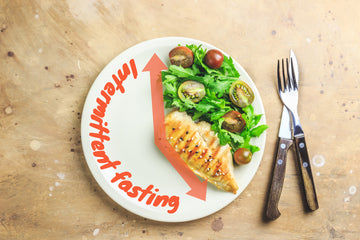8 Ways to Tell You’re Emotionally Eating and How to Stop
by Anthony Benjamin on Oct 12, 2022

8 Ways to Tell You’re Emotionally Eating and How to Stop
Have you ever found yourself reaching for a bag of chips when you’re stressed or sneaking
into the freezer to snag some ice cream after having a big blowout with a friend or family
member? You’re not alone. It’s incredibly common to reach for food to comfort us during
tough times; however, if you find that you’re doing this all too often – especially after
weight-loss surgery – you can wind up harming yourself in the long run. Learn all about
emotional eating, how you can tell if you’re engaging in it, and how you can break the habit
and lead a healthier, happier life:
What Is Emotional Eating?
Emotional eating happens when you eat for reasons other than physical hunger. Often, you reach for food – typically sweets or junk food – when you feel negative emotions like sadness, loneliness, stress, anger, or boredom. It’s a way to cope with or distract yourself from negative situations. Eating is pleasurable, so you may seek to fill that emotional void with something comforting to deal with major life events or, more commonly, the hassles of daily life. Unfortunately, emotional eating can cause you to ignore your body’s natural hunger cues, which can lead to overeating and, ultimately, sabotaging your weight-loss goals.
What’s So Bad About Emotionally Eating?
Emotionally eating can harm both your body and your mind. When you automatically reach for food during difficult times, you wind up perpetuating a vicious cycle: your emotions trigger you to overeat à you mindlessly eat more than you should à you feel guilt, shame, and powerlessness à the cycle begins again. This can take a toll on both your physical and mental wellbeing.
For those who have had bariatric surgery, emotional eating can be especially dangerous. After you’ve had weight-loss surgery, you cannot use food as a crutch like you might have done in the past. Emotional eating or food addictions can pose significant problems to your new body, especially since your stomach pouch is small.
How Can You Tell if You’re Emotionally Eating?
Everyone eats for reasons other than physical hunger every once in a while. However, if you find yourself reaching for food more often, especially to self-soothe, you might be eating emotionally. Here are 8 ways to find out:
- Your eating habits change when you’re stressed. You might have really great self-control in good times and eat healthy food at a mindful pace. However, whenever you’re stressed, you might have difficulties in slowing down to enjoy your food. You might “fog eat” – mindlessly munching on foods that offer little to no nutrition. The next thing you know, that bag of chips you just opened is suddenly empty, minus a few lingering crumbs.
- You eat when you’re not hungry or when you feel full. Hunger pangs are our body’s way of signaling we need to provide it with nourishing food. If you find that you’re eating when you’re not physically hungry, you’re trying to satisfy your emotional cravings. Likewise, if you binge on food and don’t pay attention to your body’s fullness cues, you’re more than likely eating emotionally.
- You eat to avoid stressful situations. You just got out of a tough meeting with your boss. What’s the first thing you feel like doing? Grabbing some candy to drown your sorrows. You may use food to ground yourself in turbulent times or when you’re experiencing difficult emotions.
- You eat to soothe negative feelings. Eating is pleasurable, so to combat negative emotions like sadness, boredom, stress, and despair, you reach for food to feel happy again. Specific textures, tastes, and smells seem to soothe the emotional hunger you’re experiencing.
- You feel guilty for eating. Do you sneak your snacks and hide the wrappers when you’re done? Do you think, “I shouldn’t be eating this” instead of enjoying your food? If you hide your food or have feelings of guilt or shame, you could be emotionally eating instead of satisfying true physical hunger.
- You have food FOMO. Known as “fear of missing out,” food FOMO happens when you watch your best friend polish off some cookies and you grab a handful for yourself or when your coworkers have a 3rd round of drinks during happy hour and you feel pressured to join in. You want to take part in the fun and maybe think that true satisfaction lies in food.
- Healthy food doesn’t seem appetizing. When you’re truly hungry, just about anything sounds good, even healthy, less appetizing food groups. Emotional hunger, on the other hand, tends to hinge on rich, sugar-laden, or processed foods.
- Your hunger feels urgent and out of the blue. Physical hunger builds up over time. Emotional hunger and cravings, however, seem to strike immediately when you’re in a stressful situation, even if you’re not hungry or you just ate.
How Can You Reduce or Stop Emotionally Eating?
If you have a tendency to eat emotionally, don’t worry – there are plenty of easy steps you can take to regain control of your eating habits and stay on track with your weight-loss goals! Here are some of our favorites to help you reshape and properly manage your relationship with food:
- Know your triggers. The first step to overcoming any challenge is awareness. If you aren’t sure what triggers you, keep a food journal and record what you eat and when – and also what you were doing and how you were feeling beforehand. You should see patterns after about a week!
- Take your time. This means no multitasking! Take a break from work and eat at a table, if possible – without distractions like your TV or smartphone. Eat intentionally and slowly in a calm area, and truly savor the medley of flavors in the food you eat. Remember to chew thoroughly, too – it’s not just good for digestion, but it’s also an excellent way to help you slow down and focus on your food!
- Listen to your body. When snacks and meals come to mind, ask yourself if you’re truly hungry. Use a hunger scale to figure out how physically hungry you really are (with 1 being not at all and 10 being famished). Satisfy your hunger pangs and stop eating as soon as you receive cues from your body that you’re full.
- Enjoy food with others. Make meals a safe haven away from the stressors of the day and opt to eat with others whenever possible. Slowing down, engaging in thoughtful conversation, and sharing hearty laughs will help you eat more mindfully.
- Make sure you’re staying hydrated. Sometimes what feels like hunger can be thirst in disguise. Before reaching for a snack, ask yourself if you’ve had enough water today. Be sure to sip water throughout the day and try these additional handy hydration tips!
- Choose rewards that aren’t food. Got through a tough project? Don’t celebrate with comfort foods like ice cream. Visit your favorite park or spend a little time reading something enjoyable instead!
- Give the craving time to pass. Did you know that cravings actually last only about three minutes? Don’t give it power. Go for a walk, dance, do something that makes you happy and distracts you.
- Work on changing your response to stressful situations and negative emotions. Instead of seeking solace in sweets or other comfort foods, take a short break. Stand up, stretch, try diaphragmatic breathing, and step out into the sunshine for a few minutes. If you find that you’re still hungry, choose a healthy snack to give you fuel and brain power to tackle your tasks!
- Find support. You’re less likely to give into mindless eating if you have a good support network. Lean on trusted friends or family members for help. Consider joining a support group like ProCare Health’s support group. You can also consider seeking help from a mental health professional to learn positive coping skills.
- Take away the temptations. Make life easier by choosing not to buy those hard-to-resist foods whenever you shop for groceries. If you’re feeling stressed or sad, postpone your trip to the store until you’re feeling better, if possible.
- Enjoy life. When you’re having fun, you’re not bored, which means you are less likely to emotionally eat. Immerse yourself in your creative hobbies, listen to your favorite music, take a “forest bath” and enjoy nature, or call your best friend when you’re down.
ProCare Health Is Here for You
Our team is proud to support you on your weight-loss journey. Please feel free to check out one of our live videos about mindful eating practices to incorporate in your life! In the meantime, don’t forget to stock up on our supplements, which are made with the best quality and bio-availability possible. Various vitamins and supplements like magnesium and the B-complex vitamins are often key to helping your body combat daily stress! Contact us today to learn more or place an order at 877-822-5808!










